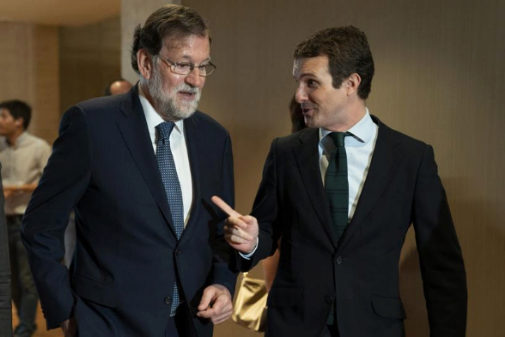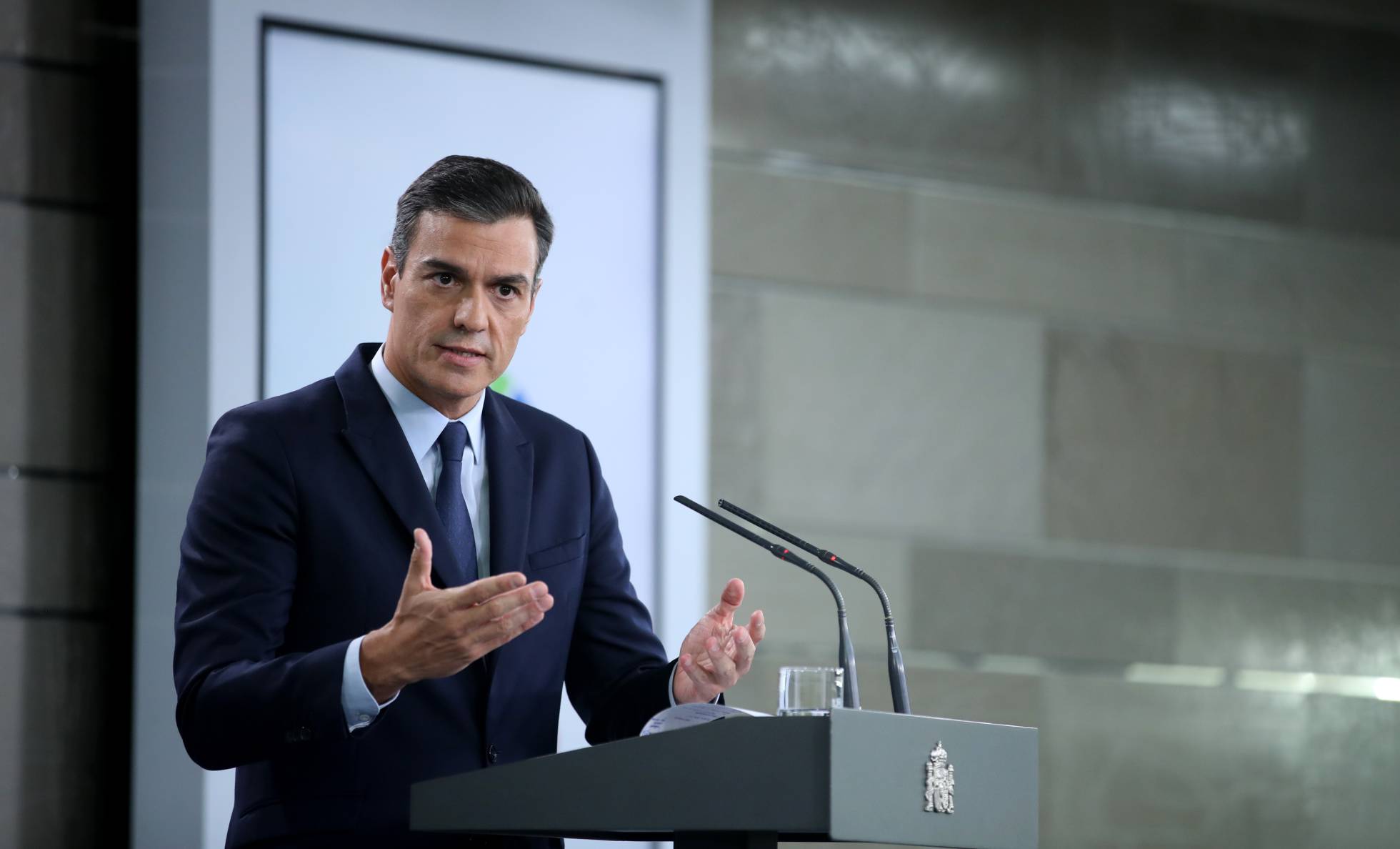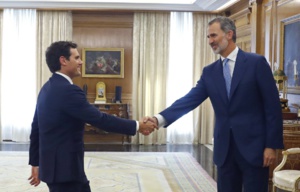Spain will hold parliamentary elections on November 10th 2019, after acting Prime Minister Pedro Sánchez failed this last Tuesday to secure enough support to be confirmed as Premier.
It will be the fourth time voters go to the polls in 4 years.
"It has been impossible to complete the mandate given to us by the Spanish people on April 28. They have made it impossible for us," Mr Sánchez informed, referring to opposition parties. "There is no majority in Congress that guarantees to build a Government, which pushes us to a repeat election on November 10."
Spain has been in political limbo since an inconclusive election in April 2019 left Spanish socialist party (PSOE) leader Pedro Sánchez without a majority to form a government. In July 2019, Parliament twice rejected his confirmation bid, and this week was his last opportunity to structure a Government. Mr Sánchez made the announcement after King Felipe VI said there are no viable candidates to lead a new government after consulting the leaders of the major political parties to know whether it was still possible to reach a deal.
However, it is not certain a repeat election would make feasible to form a government. Opinion polls show that Socialists, even though they will win more seats, will be unable to secure a majority of their own. "Pedro Sanchez had a mandate to form a government. But he did not want to. Arrogance and disdain for the basic rules of parliamentary democracy have come before common sense," said Mr Pablo Iglesias, the leader of the far-left Unidas Podemos, in response to Mr Sanchez's announcement.
"It has been impossible to complete the mandate given to us by the Spanish people on April 28. They have made it impossible for us," Mr Sánchez informed, referring to opposition parties. "There is no majority in Congress that guarantees to build a Government, which pushes us to a repeat election on November 10."
Spain has been in political limbo since an inconclusive election in April 2019 left Spanish socialist party (PSOE) leader Pedro Sánchez without a majority to form a government. In July 2019, Parliament twice rejected his confirmation bid, and this week was his last opportunity to structure a Government. Mr Sánchez made the announcement after King Felipe VI said there are no viable candidates to lead a new government after consulting the leaders of the major political parties to know whether it was still possible to reach a deal.
However, it is not certain a repeat election would make feasible to form a government. Opinion polls show that Socialists, even though they will win more seats, will be unable to secure a majority of their own. "Pedro Sanchez had a mandate to form a government. But he did not want to. Arrogance and disdain for the basic rules of parliamentary democracy have come before common sense," said Mr Pablo Iglesias, the leader of the far-left Unidas Podemos, in response to Mr Sanchez's announcement.
A brief explanation of how Spain reached this point.
In June 2018, Prime Minister Mariano Rajoy was ousted in a no-confidence vote after his party, the center-right Partido Popular (PP), became embroiled in a truly massive corruption scandal. This paved the way for Mr Sánchez (PSOE) to become the current Prime Minister. However, Mr Sánchez had to rely on a cluster of smaller parties to oust Mr Rajoy, including those representing the 'Basque country' and Catalonia, two autonomous regions in Spain that have strong independence movements.
Thus, Mr Sánchez’s support was extremely fragile to begin with, and it eventually crumbled when the Catalan parties and one Basque party —along with the opposition— rejected Mr Sánchez’s budget in February 2019. The Prime Minister called snap elections for April 2019 as the only way to possibly shore up power —the PSOE only had 84 seats in its 350-member legislature, called the Congress of Deputies— and break the impasse. Nevertheless, these snap elections did not exactly break the deadlock. PSOE won 123 seats but fell way short of the majority required to rule without support from other parties. The big reflexion after the April vote: which party would join Mr Sánchez’s government?
Unidas Podemos, a coalition of leftist parties, seemed like the obvious choice. But negotiations failed over the Summer 2019 between Unidas Podemos and PSOE within a battle across government ministers —which was really a fight about how large a role Unidas Podemos would have in any 'coalition government.'
Besides Unidas Podemos, Mr Sánchez apparently did not have many other tactical options for a governing partner. Spain’s politics have traditionally been dominated by the two major political parties: the center-left PSOE and the center-right Partido Popular (PP). But the political landscape began fragmenting more dramatically in the wake of the 2008 economic crisis and, more recently, the Catalonia independence referendum in 2017.
This has given rise to alternative parties like Unidas Podemos on the left, and on the right, Ciudadanos, a center-right party, and Vox, a solid right party which won 24 seats in Spain’s Parliament in April’s elections.
Although Mr Sánchez did not have many other possible government partners, and discussions with Unidas Podemos mostly fell apart, Spanish Parliament still had a vote in July to monitor whether Mr Sánchez eared the support of Parliament to be Prime Minister: he did not win it. That set a two-month countdown to try to secure the backing of Spain’s Parliament for his 'premiership' by September 23, or go back to the voters.
With that deadline approaching, Spain’s monarch King Felipe VI, got involved in the process. The King held meetings this week to decide if Parliament finally could get behind one prime minister to lead a government ahead of an “investiture vote.” In Spain, the Parliament essentially votes on whether they are backing a specific Prime Minister, not the Government itself.
But usually the best way to actually win that vote is to possess the ability to form a government, arranging the votes in place to prevail. Since neither Mr Sánchez nor any other opposition leader had enough support, King Felipe VI concluded that 'there was no consensus on who could lead a government.' Which meant elections are almost inevitable, even if technically the deadline to publish Elections' Day is September 23.
In June 2018, Prime Minister Mariano Rajoy was ousted in a no-confidence vote after his party, the center-right Partido Popular (PP), became embroiled in a truly massive corruption scandal. This paved the way for Mr Sánchez (PSOE) to become the current Prime Minister. However, Mr Sánchez had to rely on a cluster of smaller parties to oust Mr Rajoy, including those representing the 'Basque country' and Catalonia, two autonomous regions in Spain that have strong independence movements.
Thus, Mr Sánchez’s support was extremely fragile to begin with, and it eventually crumbled when the Catalan parties and one Basque party —along with the opposition— rejected Mr Sánchez’s budget in February 2019. The Prime Minister called snap elections for April 2019 as the only way to possibly shore up power —the PSOE only had 84 seats in its 350-member legislature, called the Congress of Deputies— and break the impasse. Nevertheless, these snap elections did not exactly break the deadlock. PSOE won 123 seats but fell way short of the majority required to rule without support from other parties. The big reflexion after the April vote: which party would join Mr Sánchez’s government?
Unidas Podemos, a coalition of leftist parties, seemed like the obvious choice. But negotiations failed over the Summer 2019 between Unidas Podemos and PSOE within a battle across government ministers —which was really a fight about how large a role Unidas Podemos would have in any 'coalition government.'
Besides Unidas Podemos, Mr Sánchez apparently did not have many other tactical options for a governing partner. Spain’s politics have traditionally been dominated by the two major political parties: the center-left PSOE and the center-right Partido Popular (PP). But the political landscape began fragmenting more dramatically in the wake of the 2008 economic crisis and, more recently, the Catalonia independence referendum in 2017.
This has given rise to alternative parties like Unidas Podemos on the left, and on the right, Ciudadanos, a center-right party, and Vox, a solid right party which won 24 seats in Spain’s Parliament in April’s elections.
Although Mr Sánchez did not have many other possible government partners, and discussions with Unidas Podemos mostly fell apart, Spanish Parliament still had a vote in July to monitor whether Mr Sánchez eared the support of Parliament to be Prime Minister: he did not win it. That set a two-month countdown to try to secure the backing of Spain’s Parliament for his 'premiership' by September 23, or go back to the voters.
With that deadline approaching, Spain’s monarch King Felipe VI, got involved in the process. The King held meetings this week to decide if Parliament finally could get behind one prime minister to lead a government ahead of an “investiture vote.” In Spain, the Parliament essentially votes on whether they are backing a specific Prime Minister, not the Government itself.
But usually the best way to actually win that vote is to possess the ability to form a government, arranging the votes in place to prevail. Since neither Mr Sánchez nor any other opposition leader had enough support, King Felipe VI concluded that 'there was no consensus on who could lead a government.' Which meant elections are almost inevitable, even if technically the deadline to publish Elections' Day is September 23.
Spain preparing upcoming elections scheduled for November 10th (10-N).
Therefore, Spain is headed for elections on November 10. The question is whether that vote will be any more conclusive than the one just a few months ago. Spain’s political system currently is not effectively equipped to deal with the rise of these smaller parties, facing an evolving new political scenario while adapting to the divisions.
Geopolitical experts, based on the current polling, advanced that, indeed, November’s vote could end up basically similar to the one in April, with PSOE likely still getting the most seats, and possibly even gaining a few more. But PSOE almost certainly will not come away with the majority. (1)
Turnout could be a huge issue, as exasperation with the current politics might tamp down enthusiasm. PSOE, PP, and Ciudadanos are already trying to rally support by promoting a 'useful vote' — basically, vote for us, and we’ll at least deliver government stability.
Whether that pitch will work after what just happened over the past few months is unclear. And probably the current local political framework should drastically change before November 10.
Therefore, Spain is headed for elections on November 10. The question is whether that vote will be any more conclusive than the one just a few months ago. Spain’s political system currently is not effectively equipped to deal with the rise of these smaller parties, facing an evolving new political scenario while adapting to the divisions.
Geopolitical experts, based on the current polling, advanced that, indeed, November’s vote could end up basically similar to the one in April, with PSOE likely still getting the most seats, and possibly even gaining a few more. But PSOE almost certainly will not come away with the majority. (1)
Turnout could be a huge issue, as exasperation with the current politics might tamp down enthusiasm. PSOE, PP, and Ciudadanos are already trying to rally support by promoting a 'useful vote' — basically, vote for us, and we’ll at least deliver government stability.
Whether that pitch will work after what just happened over the past few months is unclear. And probably the current local political framework should drastically change before November 10.

Mr Pablo Casado with Mr Mariano Rajoy (current and latest PP leaders) on July 2019 in Madrid, Spain. Source: David Mudarra (El Mundo)
Spain is also facing, like other European countries, fears of an economic downtown — made worse by the deep uncertainty of Brexit's fluctuations in the UK. And within Spain socio-economic scenario, the sentences in the Catalonian separatists trials ('sentencia del procés') are expected this fall, which relate to the illegal independence referendum Catalonia held in 2017. Catalonia’s breakaway attempt helped instigate a resurgence in Spanish nationalism, which played into April’s elections. Most likely, the final stage of the trials will reignite the issue once again.
All of which means the status quo could easily be derailed by November 2019 (10-N). The key issue is whether this might generate a more decisive electoral outcome, or just muddle Spanish politics a step further down.
(1) We suggest to read an article in Spanish published by El Mundo on 20.09.2019: 'La banca de inversión sitúa a España en una posición "muy vulnerable" por la falta de pactos políticos.'
All of which means the status quo could easily be derailed by November 2019 (10-N). The key issue is whether this might generate a more decisive electoral outcome, or just muddle Spanish politics a step further down.
(1) We suggest to read an article in Spanish published by El Mundo on 20.09.2019: 'La banca de inversión sitúa a España en una posición "muy vulnerable" por la falta de pactos políticos.'
Tags :
10-N
Catalonia’s breakaway attempt
Main Spanish political parties: Ciudadanos_PP PSOE_Unidas Podemos and VOX
Prime Minister Pedro Sánchez
Spain elections November 2019
Spanish nationalism
Posted by Christopher Oscar de Andrés, on Thursday, September 19th 2019 at 07:35
|
Comments (0)
New comment:
Category
Recent posts
Archives
#Team Management #Gestión de Equipo International Business Development #Gestión de Equipo Comercial
5 MISSION AREAS IN HORIZON EUROPE
Acceso universal al tratamiento del sida
ACNUR
actor Pepe Sancho
ADHESIÓN DE CROACIA A LA UE
advertising / teleshopping spots
Africa
Alianza Atlántica
Alianza del Pacífico
Alibaba
Alibaba Group Holding Ltd.
AlipayApp
Amnistía Internacional
Ana Pastor
AnálisisyGestiónInteligenteDeDatos
Angela Merkel
Banco Central Europeo (BCE)
Banco Mundial
Barack Obama
batalla del sector del taxi y VTC
Benjamin Franklin
Bill Gates
binomio chavismo / antichavismo
Blockchain opportunities in international public health care sector
Blockchain technologies in health care
Blog Posts
Boris Johnson
Brexit
BUILDING THE CITIES OF THE FUTURE
China
Comisión Europea
Coronavirus
Covid-19
COVID-19
Cybercrime
David Cameron
Editorial Universitas SA
EU Convention of Human Rights
European Commission
FMI
Henrique Capriles
Human Rights
ICAA
International Business Development
Jack Ma
Jean-Claude Juncker
Mariano Rajoy
Obama
ONU
OSCE
The Council of Europe
Thomas Hammarberg
UNED
UNHCR
Unión Europea
Vladímir Putin








